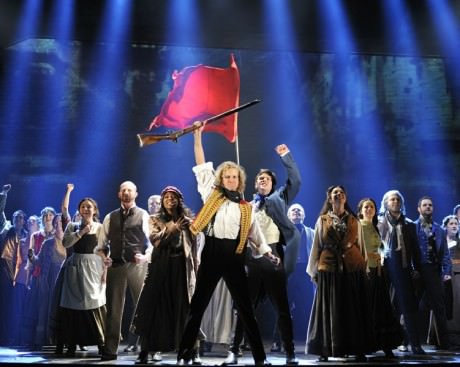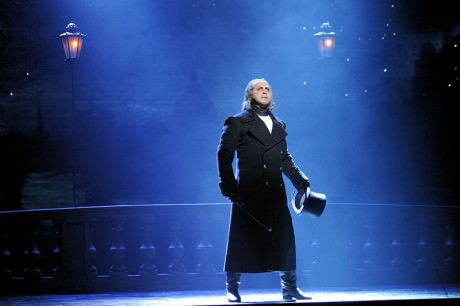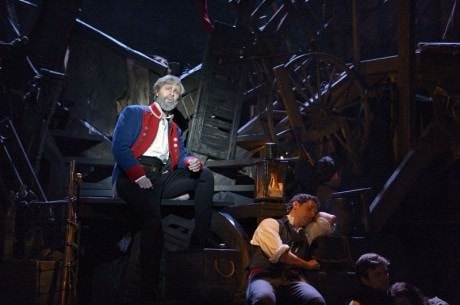I was one of those girls that belted out “On My Own” incessantly in my bedroom as a teenager and have been a bit of a Les Mis junkie since first hearing many of its most recognizable songs in high school choir – thanks to my teacher’s undying love of the show we performed a melody of the show’s songs more than once.

‘Les Misérables.’ Photo by Deen van Meer.
Cameron Mackintosh’s new 25th Anniversary Production of Boublil and Schonberg’s mega-hit, now playing at DC’s National Theatre, certainly does justice to the material. Even slightly scaled down from the original, the heart of the story still shines through as does the rich and powerful music. A mostly strong cast of actor-singers, stellar production values, and a strong 14-piece orchestra make this show one to see over the holiday season.
Les Misérables, of course, is based on the well-known 1862 novel by Frenchman Victor Hugo. Jean Valjean (Peter Lockyer) has recently been released from nineteen years in prison for stealing some bread. After a bishop (James Zannelli) treats him kindly, he sets out on a new life although he remains haunted of his past thanks to a ‘man of the law’ (Javert, played by Andrew Varela) pursuing him. A promise made to a young sickly mother (Fantine, played by Genevieve Leclerc) leads him to devote his life to taking care of her daughter (Cosette, played by Erin Cearlock or Abbey Rose Gould as a young child and Lauren Wiley as an adult) who is being ‘cared’ for by some despicable innkeepers, the Thénardiers (Shawna M. Hamic and Timothy Gulan). After he and Cosette set off for Paris, a period of unrest emerges in the city and many young students take to the street to obtain justice and a better life for the poor, powerless, and depraved.
One such young student (Marius, played by Devin Ilaw) pines for the young and pretty Cosette although another young scrappy girl from Cosette’s past, Eponine (Briana Carson-Goodman), is also in love with him. Jean Valjean proves his inner-goodness again as he fights along with the courageous men and saves Marius even as all of the other rebels are killed in the fighting. In essence, the timeless story is about love, redemption, and courage and the need to place the good of others above one’s self.
Nearly sung-through, this musical captures the epic and intense feelings that emerge during this tumultuous time in French history through song. Economic depravity is sung about and discussed as well as the various socio-political tensions although, make no mistake, there is love story angle for those not interested in those kinds of things. Claude-Michel Schonberg’s music is swelling and Alain Boublil and Jean-Marc Natel’s original French text/lyrics are powerful as are Herbert Kretzmer’s English lyrics used in this production. A strong cast, including an energetic ensemble, is mostly capable of dealing with all of these vocal and acting complexities although there are several standouts (but, alas, also a few weak links).
Varela wholly embodies the authoritarian and legalistic Javert and his booming baritone voice is simply perfect for the memorable songs “Stars” and “Soliloquy.” There’s a reason he received extended applause on the night I attended the show – he was, by far, the standout performer. Lockyer is equally strong of an actor as the show’s hero, Valjean. Although I would prefer a more vocally dynamic take some of the character’s signature songs (“Who Am I?,” for instance), he more than proves his lyric interpretation prowess. His contemplative and emotional “Bring Him Home” is among the most effective renditions I’ve heard.
Leclerc makes the most of her brief time on stage as Fantine. So many times, this show is cast with a Fantine who can belt out the well-known song “I Dreamed a Dream” prettily, but who is a bit lacking in the acting department. Leclerc is certainly exceptional in that she displays strong vocals in the character’s signature number – and I appreciated her adding her own spin on the song’s beginning – but she is also believable as a down-on-her-luck tenacious and gritty woman who would do anything for her child, including sell her body in the most horrible of circumstances.

Meer.
Gulan and Hamic portray the Thénardiers with copious amounts of comedy. Gulan gives one of the more understated takes on Thénardier I have seen and plays him less as a cartoon, but more like a foolish person. I very much appreciated that choice. Like Leclerc, Hamic puts her own spin on the role of Madame Thénardier and certainly sells “Master of the House” and “Beggars at the Feast.” Her stage presence is undeniable. Carson-Goodman is appropriately feisty as Eponine and, particularly when singing at full voice, she proves she definitely has the chops to do justice to “On My Own.” She shows her softer and more introspective side when singing “A Little Fall of Rain.” Here, I particularly appreciate that she doesn’t belt out the number (after all, her character is dying) and focuses on the lyrics rather than demonstrating what she can do vocally.
Less successful are Lauren Wiley as Cosette and Devin Ilaw as Marius. Granted, the characters as written lack depth, but (at the performance I witnessed) both simply proved that they were not up to the vocal demands of “In My Life” and “A Heart Full of Love.” It’s obvious that Wiley has a trained soprano voice, but at my performance her vocals were far too nasal for my liking and she had a few pitch issues here and there. She also seemed to unfortunately lack any connection with romantic lyrics. A certain lack of chemistry with Ilaw and Lockyer also made her ‘acting’ scenes fall flat.
Although Ilaw’s vocals were not the most powerful in the aforementioned duets (at my performance), and some diction issues made him quite difficult to understand throughout the show, he certainly redeemed himself with his rendition of the heart-wrenching “Empty Chairs and Empty Tables” sung as Marius reflects on the loss of his fellow comrades. His vocals, at this point, were powerful and he reflected on the meaning of the lyrics in ways that he did not do with the love duets.
Laurence Connor and James Powell (Directors) put their own creative spin on this show as does Michael Ashcroft (Musical Staging). Their staging of Javert’s suicide is among the most interesting and unique I’ve seen although I won’t give it away here. The focus here is less on spectacle – the turntable is gone (among other things) and I don’t miss it – and more on the telling of the story. The barricade is still as impressive and mammoth as ever, but the sets and images (Matt Kinley, with inspiration from Victor Hugo’s paintings) are generally minimal though intricate and decidedly rustic and 19th century France. Kinley’s beautiful imagery (with projections realized by Fifty-Nine Productions) further establishes time/place and add ambience without being too overkill. The ones used when Marius and Valjean enter Paris’ sewer tunnels are among the most effective and are, in fact, quite perfect. Mick Potter’s sound design and Paule Constable lighting design are also stellar, particularly during the barricade scenes. Andreane Neofitou’s costumes (with additional ones by Christine Rowland) are also appropriate for 19th century France and display beautiful handiwork using multiple fabrics and colors.
Under the direction of Lawrence Goldberg, a strong 18-piece orchestra comprised of local and touring musicians sounds larger than it is and plays Christopher Jahnke’s new orchestrations (with additional orchestrations by Stephen Metcalfe and Stephen Brooker) with vigorous energy and technical precision. I certainly prefer John Cameron’s original orchestrations – they sound much fuller and richer to my ear- but the new ones are certainly acceptable.
I generally get slightly worried about scaled down tours after some not-so-great experiences in recent years, but this touring production of the classic musical is one to see – even for Les Misérables fanatics. Cameron Mackintosh deserves many, many accolades for not sacrificing the integrity of the piece and, in some cases, allowing it to be further enhanced.

Running Time: Nearly three hours, with one intermission.
Les Misérables plays through December 30, 2012 at The National Theatre – 1321 Pennsylvania Avenue, NW in Washington, DC. For tickets, call (202) 628-6161 or (800) 447-7400, or purchase them online through Telecharge.
LINKS
Les Misérables tour website.
Joel Markowitz’s interview with Andrew Varela on DCMetroTheaterArts.




